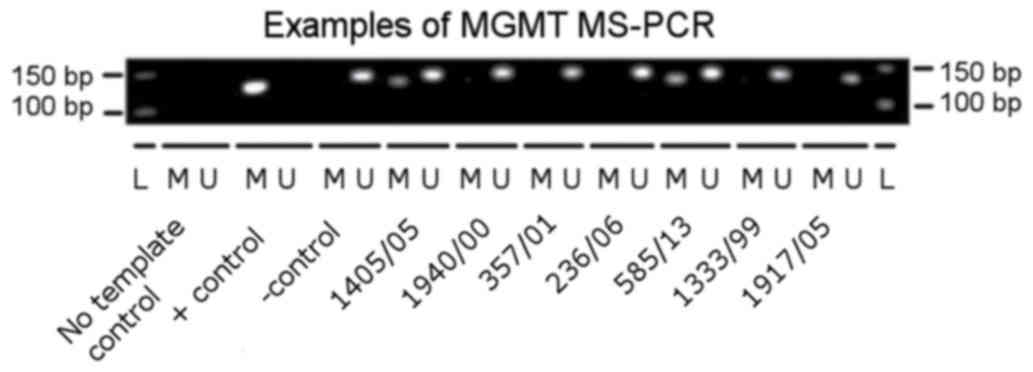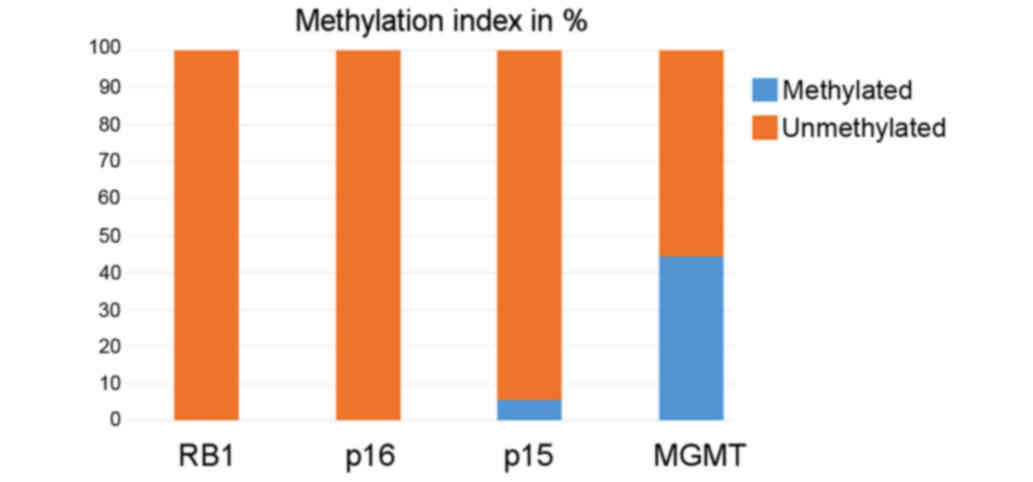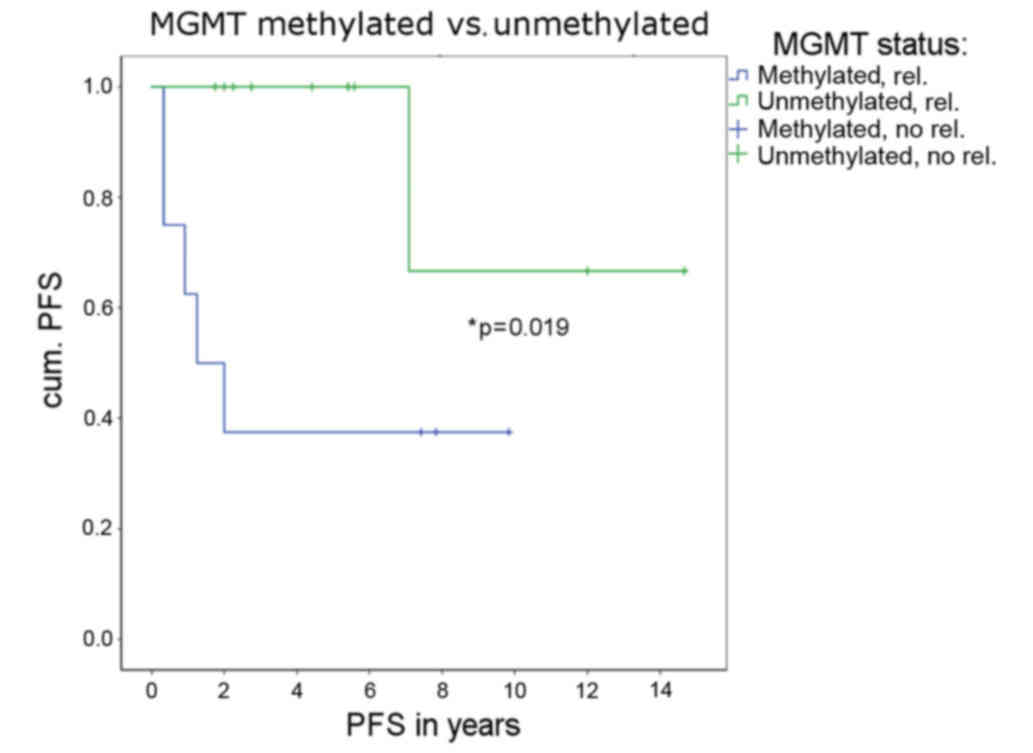|
1
|
US Cancer Statistics Working Group: United
States Cancer Statistics: 1999–2009 incidence and mortality
web-based report. Atlanta: U.S. Department of Health and Human
Services, Centers for Disease Control and Prevention and National
Cancer Institute; https://www.cdc.gov/uscs1–June. 20162013
|
|
2
|
Mandiwanza T, Kaliaperumal C, Khalil A,
Sattar M, Crimmins D and Caird J: Suprasellar pilocytic
astrocytoma: One national center's experience. Childs Nerv Syst.
30:1243–1248. 2014. View Article : Google Scholar : PubMed/NCBI
|
|
3
|
Koeller KK and Rushing EJ: From the
archives of the AFIP: Pilocytic astrocytoma: Radiologic-pathologic
correlation. Radiographics. 24:1693–1708. 2004. View Article : Google Scholar : PubMed/NCBI
|
|
4
|
Burkhard C, Di Patre PL, Schüler D,
Schüler G, Yaşargil MG, Yonekawa Y, Lütolf UM, Kleihues P and
Ohgaki H: A population-based study of the incidence and survival
rates in patients with pilocytic astrocytoma. J Neurosurg.
98:1170–1174. 2003. View Article : Google Scholar : PubMed/NCBI
|
|
5
|
Stokland T, Liu JF, Ironside JW, Ellison
DW, Taylor R, Robinson KJ, Picton SV and Walker DA: A multivariate
analysis of factors determining tumor progression in childhood
low-grade glioma: A population-based cohort study (CCLG CNS9702).
Neuro Oncol. 12:1257–1268. 2010.PubMed/NCBI
|
|
6
|
Louis DN, Ohgaki H, Wiestler O and Cavenee
WK: WHO Classification of Tumours of the Central Nervous System.
Fourth Edition. International Agency for Research on Cancer; Lyon,
France: 2007
|
|
7
|
Fisher GP, Tihan T, Goldthwaite PT, Wharam
MD, Carson BS, Weingart JD, Repka MX, Cohen KJ and Burger PC:
Outcome analysis of childhood low-grade astrocytomas. Pediatr Blood
Cancer. 51:245–250. 2008. View Article : Google Scholar : PubMed/NCBI
|
|
8
|
Shibahara I, Gawaguchi T, Kanamory M,
Yonezawa S, Takazawa H, Asano K, Ohkuma H, Kaimori M, Sasaki T and
Nishijima M: Pilocytic astrocytoma with histological malignant
without previous radiation therapy-case report. Neurol Med Chir
(Tokyo). 51:144–147. 2011. View Article : Google Scholar : PubMed/NCBI
|
|
9
|
Johnson DR, Brown PD, Galanis E and
Hammack JE: Pilocytic astrocytoma survival in adults: Analysis of
the surveillance, epidemiology, and end results program of the
national cancer institute. J Neurooncol. 108:187–193. 2012.
View Article : Google Scholar : PubMed/NCBI
|
|
10
|
Korshunov A, Meyer J, Capper D, Christians
A, Remke M, Witt H, Pfister S, von Deimling A and Hartmann C:
Combined molecular analysis of BRAF and IDH1 distinguishes
pilocytic astrocytoma from diffuse astrocytoma. Acta Neuropathol.
118:401–405. 2009. View Article : Google Scholar : PubMed/NCBI
|
|
11
|
Zhang J, Wu G, Miller CP, Tatevossian RG,
Dalton JD, Tang B, Orisme W, Punchihewa C, Parker M, Qaddoumi I, et
al: Whole-genome sequencing identifies genetic alterations in
pediatric low-grade gliomas. Nat Genet. 45:602–612. 2013.
View Article : Google Scholar : PubMed/NCBI
|
|
12
|
Theeler BJ, Ellezam B, Sadighi ZS, Mehta
V, Tran MD, Adesina AM, Bruner JM and Puduvalli VK: Adult pilocytic
astrocytomas: Clinical features and molecular analysis. Neuro
Oncol. 16:841–847. 2014. View Article : Google Scholar : PubMed/NCBI
|
|
13
|
Wemmert S, Romeike BF, Ketter R, Steudel
WI, Zang KD and Urbschat S: Intratumoral genetic heterogeneity in
pilocytic astrocytomas revealed by CGH-analysis of microdissected
tumor cells and FISH on tumor tissue sections. Int J Oncol.
28:353–360. 2006.PubMed/NCBI
|
|
14
|
Hasselblatt M, Riesmeier B, Lechtape B,
Brentrup A, Stummer W, Albert FK, Sepehrnia A, Ebel H, Gerss J and
Paulus W: BRAF-KIAA1549 fusion transcripts are less frequent in
pilocytic astrocytomas diagnosed in adults. Neuropathol Appl
Neurobiol. 37:803–806. 2011. View Article : Google Scholar : PubMed/NCBI
|
|
15
|
Rodriguez EF, Scheithauer BW, Giannini C,
Rynearson A, Cen L, Hoesley B, Gilmer-Flynn H, Sarkaria JN, Jenkins
S, Long J and Rodriguez FJ: PI3K/AKT pathway alterations are
associated with clinically aggressive and histologically anaplastic
subsets of pilocytic astrocytoma. Acta Neuropathol. 121:407–420.
2011. View Article : Google Scholar : PubMed/NCBI
|
|
16
|
Jones DT, Hutter B, Jäger N, Korshunov A,
Kool M, Warnatz HJ, Zichner T, Lambert SR, Ryzhova M, Quang DA, et
al: Recurrent somatic alterations of FGFR1 and NTRK2 in pilocytic
astrocytoma. Nat Genet. 45:927–932. 2013. View Article : Google Scholar : PubMed/NCBI
|
|
17
|
Brokinkel B, Peetz-Dienhart S, Ligges S,
Brentrup A, Stummer W, Paulus W and Hasselblatt M: A comparative
analysis of MAPK pathway hallmark alterations in pilocytic
astrocytomas: Age-related and mutually exclusive [corrected].
Neuropathol Appl Neurobiol. 41:258–261. 2015. View Article : Google Scholar : PubMed/NCBI
|
|
18
|
Medress ZA, Xu LW, Ziskin JL, Lefterova
MI, Vogel H and Li G: Pilocytic astrocytoma with IDH1 mutation in
the cerebellum of an elderly patient. Clin Neuropathol. 34:96–98.
2015. View
Article : Google Scholar : PubMed/NCBI
|
|
19
|
Behling F, Steinhilber J, Tatagiba M,
Bisdas S and Schittenhelm J: IDH1 R132H mutation in a pilocytic
astrocytoma: A case report. Int J Clin Exp Pathol. 8:11809–11813.
2015.PubMed/NCBI
|
|
20
|
Wemmert S, Bettscheider M, Alt S, Ketter
R, Kammers K, Feiden W, Steudel WI, Rahnenführer J and Urbschat S:
p15 promoter methylation - a novel prognostic marker in
glioblastoma patients. Int J Oncol. 34:1743–1748. 2009.PubMed/NCBI
|
|
21
|
Bartek J, Bartkova J and Lukas J: The
retinoblastoma protein pathway and the restriction point. Curr Opin
Cell Biol. 8:805–814. 1996. View Article : Google Scholar : PubMed/NCBI
|
|
22
|
Gil J and Peters G: Regulation of the
INK4b-ARF-INK4a tumor suppressor locus: All for one or one for all.
Nat Rev Mol Cell Biol. 7:667–677. 2006. View Article : Google Scholar : PubMed/NCBI
|
|
23
|
Jen J, Harper JW, Bigner SH, Bigner DD,
Papadopoulos N, Markowitz S, Willson JK, Kinzler KW and Vogelstein
B: Deletion of p16 and p15 genes in brain tumors. Cancer Res.
54:6353–6358. 1994.PubMed/NCBI
|
|
24
|
Schmidt EE, Ichimura K, Reifenberger G and
Collins VP: CDKN2 (p16/MTS1) gene deletion or CDK4 amplification
occurs in the majority of glioblastomas. Cancer Res. 54:6321–6324.
1994.PubMed/NCBI
|
|
25
|
Simon M, Köster G, Menon AG and Schramm J:
Functional evidence for a role of combined CDKN2A
(p16-p14(ARF))/CDKN2B (p15) gene inactivation in malignant gliomas.
Acta Neuropathol. 98:444–452. 1999. View Article : Google Scholar : PubMed/NCBI
|
|
26
|
Rasheed A, Herndon JE, Stenzel TT, Raetz
JG, Kendelhardt J, Friedman HS, Friedman AH, Bigner DD, Bigner SH
and McLendon RE: Molecular markers of prognosis in astrocytic
tumors. Cancer. 94:2688–2697. 2002. View Article : Google Scholar : PubMed/NCBI
|
|
27
|
Nakamura M, Watanabe T, Yonekawa Y,
Kleihues P and Ohgaki H: Promoter methylation of the DNA repair
gene MGMT in astrocytomas is frequently associated with G:C->
A:T mutations of the TP53 tumor suppressor gene. Carcinogenesis.
22:1715–1719. 2001. View Article : Google Scholar : PubMed/NCBI
|
|
28
|
Komine C, Watanabe T, Katayama Y, Yoshino
A, Yokoyama T and Fukushima T: Promoter methylation of the DNA
repair gene O6-methylguanine-DNA methyltransferase is an
independent predictor of shortened progression free survival in
patients with low-grade diffuse astrocytomas. Brain Pathol.
13:176–184. 2003. View Article : Google Scholar : PubMed/NCBI
|
|
29
|
Munot K, Bell SM, Lane S, Horgan K, Hanby
AM and Speirs V: Pattern of expression of genes linked to
epigenetic silencing in human breast cancer. Hum Pathol.
37:989–999. 2006. View Article : Google Scholar : PubMed/NCBI
|
|
30
|
Jha Chintamani BP, Bhandari V, Bansal A,
Saxena S and Bhatnagar D: The expression of mismatched repair genes
and their correlation with clinicopathological parameters and
response to neo-adjuvant chemotherapy in breast cancer. Int Semin
Surg Oncol. 4:52007. View Article : Google Scholar : PubMed/NCBI
|
|
31
|
Sharma G, Mirza S, Parshad R, Srivastava
A, Gupta SD, Pandya P and Ralhan R: Clinical significance of
promoter hypermethylation of DNA repair genes in tumor and serum
DNA in invasive ductal breast carcinoma patients. Life Sci.
87:83–91. 2010. View Article : Google Scholar : PubMed/NCBI
|
|
32
|
Hegi ME, Liu L, Herman JG, Stupp R, Wick
W, Weller M, Mehta MP and Gilbert MR: Correlation of
O6-methylguanine methyltransferase (MGMT) promoter methylation with
clinical outcomes in glioblastoma and clinical strategies to
modulate MGMT activity. J Clin Oncol. 26:4189–4199. 2008.
View Article : Google Scholar : PubMed/NCBI
|
|
33
|
Herman JG, Graff JR, Myöhänen S, Nelkin BD
and Baylin SB: Methylation-specific PCR: A novel PCR assay for
methylation status of CpG islands. Proc Natl Acad Sci USA.
93:9821–9826. 1996. View Article : Google Scholar : PubMed/NCBI
|
|
34
|
Felsberg J, Rapp M, Loeser S, Fimmers R,
Stummer W, Goeppert M, Steiger HJ, Friedensdorf B, Reifenberger G
and Sabe MC: Prognostic significance of molecular markers and
extent of resection in primary glioblastoma patients. Clin Cancer
Res. 15:6683–6693. 2009. View Article : Google Scholar : PubMed/NCBI
|
|
35
|
Wong IH, Lo YM, Yeo W, Lau WY and Johnson
PJ: Frequent p15 promoter methylation in tumor and peripheral blood
from hepatocellular carcinoma patients. Clin Cancer Res.
6:3516–3521. 2000.PubMed/NCBI
|
|
36
|
Simpson DJ, Hibberts NA, McNicol AM,
Clayton RN and Farrell WE: Loss of pRb expression in pituitary
adenomas is associated with methylation of the RB1 CpG island.
Cancer Res. 60:1211–1216. 2000.PubMed/NCBI
|
|
37
|
Capper D, Weißert S, Balss J, Habel A,
Meyer J, Jäger D, Ackermann U, Tessmer C, Korshunov A, Zentgraf H,
et al: Characterization of R132H mutation-specific IDH1 antibody
binding in brain tumors. Brain Pathol. 20:245–254. 2010. View Article : Google Scholar : PubMed/NCBI
|
|
38
|
Alford R, Gargan L, Bowers DC, Klesse LJ,
Weprin B and Koral K: Postoperative surveillance of pediatric
cerebellar pilocytic astrocytoma. J Neurooncol. 130:149–154. 2016.
View Article : Google Scholar : PubMed/NCBI
|
|
39
|
Klein O, Grignon Y, Civit T, Pinelli C,
Auque J and Marchal JC: Childhood diencephalic pilocytic
astrocytoma. A review of seven observations. Neurochirurgie.
52:3–14. 2006.(In French). View Article : Google Scholar : PubMed/NCBI
|
|
40
|
Uhlmann K, Rohde K, Zeller C, Szymas J,
Vogel S, Marczinek K, Thiel G, Nürnberg P and Laird PW: Distinct
methylation profiles of glioma subtypes. Int J Cancer. 106:52–59.
2003. View Article : Google Scholar : PubMed/NCBI
|
|
41
|
Gonzalez-Gomez P, Bello J, Lomas J, Arjona
D, Alonso ME, Amiñoso C, De Campos JM, Vaquero J, Sarasa JL,
Casartelli C and Rey JA: Epigenetic changes in pilocytic
astrocytomas and medulloblastomas. Int J Mol Med. 11:655–660.
2003.PubMed/NCBI
|
|
42
|
Wemmert S, Ketter R, Rahnenführer J,
Beerenwinkel N, Strowitzki M, Feiden W, Hartmann C, Lengauer T,
Stockhammer F, Zang KD, et al: Patients with high-grade gliomas
harboring deletions of chromosomes 9p and 10q benefit from
temozolomide treatment. Neoplasia. 7:883–893. 2005. View Article : Google Scholar : PubMed/NCBI
|
|
43
|
Skorpen F and Krokan HE: The methylation
status of the gene for O6-methylguanine-DNA methyltransferase in
human Mer+ and Mer− cells. Carcinogenesis.
16:1857–1863. 1995. View Article : Google Scholar : PubMed/NCBI
|
|
44
|
Esteller M, Hamilton SR, Burger PC, Baylin
SB and Herman JG: Inactivation of the DNA repair gene
O6-methylguanine-DNA methyltransferase by promoter hypermethylation
is a common event in primary human neoplasia. Cancer Res.
59:793–797. 1999.PubMed/NCBI
|
|
45
|
Lissa D and Robles AI: Methylation
analyses in liquid biopsy. Transl Lung Cancer Res. 5:492–504. 2016.
View Article : Google Scholar : PubMed/NCBI
|
|
46
|
Mitchell SM, Ho T, Brown GS, Baker RT,
Thomas ML, McEvoy A, Xu ZZ, Ross JP, Lockett TJ, Young GP, et al:
Evaluation of methylation biomarkers for detection of circulating
tumor DNA and application to colorectal cancer. Genes (Basel).
7:pii: E125. 2016. View Article : Google Scholar
|

















